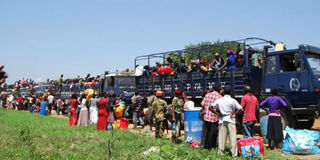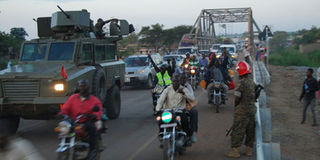Why Ugandans continue to risk it all in South Sudan

Whether it is quest for money or employment opportunities that drives Ugandans into the world’s youngest but violent South Sudan is something to ponder.
But beyond this is the bigger question. What has lured so many from several countries into risking their lives in a country known for a people sucked into inordinate tribal conflicts?
South Sudan, with all fairness, cannot grow its economy, governance, peace and security on its own.
It has to be assisted. This perhaps helps to explain why.
At Oraba border post, fleets of trucks snake into the country every day with loads of merchandise, fuel, building materials and assortment of foods. They pile in long queues waiting to be cleared.
The country, just like many that have survived through war, has vast opportunities and the risk could be worth it in a region dogged by unemployment and near-stunted growth.
Uganda, for instance, has an unemployment rate of more than 64 per cent. Kenya, according to Kenya Bureau of Statistics, puts its own at 40 per cent.
In Ethiopia, unemployment stands above 35 per cent and the figures are not any better in other countries within the region.
This, despite the highest of risks, explains why many seek a home in South Sudan to share in the fortunes, especially that the country had woken up to after decades of war.
Everything in South Sudan seems so virgin yet its violent nature threatens even the little gains so far achieved.
Car owners tell the story better as they have harvested hugely from the transport sector that has no formal bidding.
At Yei, passengers stream in multitudes but at the risk of violence that threatens to ruin everything.

People wait to be evacuated at a collection centre in Juba.
Before the violence, Salim Hamid, a taxi driver, would work the wheels, earning at least Shs250,000 for a journey from Arua through Koboko to Yei. This is no longer the case. The exploits drastically dwindled as passengers stay away from the violence nagging South Sudan.
For people like Hamid, they had endured the risks to earn an income and “surely if it was not for unemployment, he says: “I would not sacrifice my life to drive to South Sudan. You can be arrested any time and violence against foreigners is the order of the day.”
Lawlessness, at least according to those who have lived or worked in the country, is the rule of the thumb, characterised by gun-totting individuals, tribal sentiments and hatred for anyone suspected to be a foreigner.
Ben Chandiga, a Ugandan doctor, was killed last Friday and it is suspected, some people who feel deprived, are targeting foreigners to settle long-held disputes.
Killings, especially those targeting foreigners, had in the last five years become a constant. But figures of the dead from such violence remains unclear.
In 2013, Ayub Abas, 35, a resident of Arua Town, was shot in the head. He died of bullet wounds at a health facility in Juba.
At that time, Abas Akuma, the father of the deceased, noted poverty and unemployment had driven his son into South Sudan because “he had no means here (Uganda). “He was the only breadwinner in our family and he used to send us financial support,” Akuma said .
Ayub’s killers are still large and Akuma has no hope of finding justice.
His relatives, who he used to support with school fees and food, look on with little or no hope.
His wife has to push through her three children without a job or a reliable source of income.
Such is South Sudan where opportunities are abound but in a volatile environment.
Trade is at the peak and it had been expected to grow after the two protagonists – Riek Machar and Salva Kiir – had signed a peace agreement in August last year after nearly two years of civil strife.
More than 100 trucks and utility vehicles from Uganda had resumed their journey into South Sudan through the Kaya border post on a daily basis. They carry all sorts of merchandise, including foodstuffs, construction materials, groceries and beverages.
But with all the political instability, few can take the risk.
The danger of the economy falling into a complete turmoil is undisputable; the county in the last week, has slid back by more than two decades.
Magnitude of the damage
The number of those at risk is yet to be established but refugees continue to pour into Uganda and other neighbouring countries.
Last Friday, Joe McHugh the Irish minister of state for diaspora and international development, said his government had offered €600,000 (Shs2.22b) to support South Sudan refugees in Uganda.
However, he warned the two leaders – Machar and Kiir - to “halt the violence immediately in the interests of the people of South Sudan”.
Amid all this, money has become a scarce item and Kiir told Al Jazeera about two weeks ago that “our problem is money. We have no money”, which could be at the centre of the violence.
Civil servants have spent months without payment and the threat of unpaid soldiers looms large.
But beyond this is the failure to implement a peace agreement, which according to Kiir, “was not made to be implemented”.
However, Machar disputes this notion because he believes “the agreement is a roadmap, first for reform, and for establishing the new system of governance in the country, which will lead us to a democratic election”.
“This [democratic election] is the aspiration of the people of South Sudan,” Machar told Al Jazeera in a separate interview.
With all this going on, the lawlessness continues with many lives counted as collateral damage.
In June 2011, two casual labourers from Uganda were allegedly tortured by a military officer in Nimule Town.
But the fear of reprisal meant that those tortured had no where to report. Some individuals in the military, according to those who have lived in the country, are law onto themselves and are accountable to none.
In April 2009, an Eritrean truck driver was hacked to death in Kaya Town but just like others, he is among those lost in the volatile country.
About a year ago, a National Constitution Review Commission was established by the government.
In a meeting with the South Sudan Law Society, respect for the rule of law and human rights was high on the agenda.
“The constitution should be reviewed to reflect peoples’ views and aspirations not individuals interest,” read part of the paper authored by the South Sudan Law Society to the Commission.
Tribal conflicts

UPDF trucks carrying Ugandans and others from several countries who had been stranded in South Sudan
Unstable politics notwithstanding, the country has been plunged into a tribal war sucking in the military. The centre is failing to hold and killing has become the alterative for solving conflict.
Everything in South Sudan has the potential to spark war. For instance, before the current violence, there had been killings resulting from border demarcations, especially in oil-rich areas.
But the big brother in the region - Uganda is determined, to help South Sudan out of the turmoil.
State minister for Disaster Preparedness and Refugees, Musa Ecweru, said government was ready to assist those fleeing the violence.
For now, he said they would partner with other organisations to provide food and shelter as well as ensure that the refugees are kept in good health.
The current misunderstanding, analysts believe, could develop into a full-blown war and could reverse the gains achieved.
The UN has condemned the violence and expressed “shock and outrage” at attacks on its facilities.
The violence has forced a cut back in crude oil output, one of the causes of the financial stress dogging the country.
South Sudan was declared independent in 2011 after breaking away from Sudan.
This ended nearly four decades of war but the peace didn’t last long.
Just after two years, there was a civil war killing thousands and displacing millions.
How far this goes will be a concern for not only South Sudan but the region and the world at large.
There is little hope in a leadership that is bent on solving misunderstandings using the barrel of the gun.
Timeline
December 15, 2013. War breaks out between forces loyal to president Salva Kiir and sucked vice president Riek Machar.
April 2014. More than 10,000 people, according to the International Crisis Group estimated are reported killed in the conflict.
August 2015. Salva Kiir and Riek Machar sign a peace agreement with a range of resolutions seeking to bring peace.
April. Riek Machar returns to Juba after he was appointed first vice president in regard to the new peace agreement.
July 11. War breaks out again pitting forces loyal to Kiir and Machar. More than 300 people are reported to have been killed.



